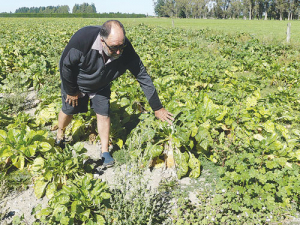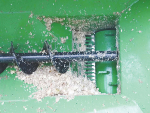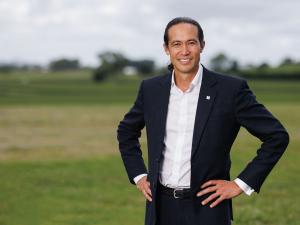After 16 years experience of feeding fodder beet to his dairy cows, Brendon Woods says he would hate to be without it.
Woods was an early adopter of fodder beet in dairy production and a key collaborator with Lincoln University senior lecturer in livestock health and production, Dr Jim Gibbs, in ironing out the early problems of acidosis and phosphorus deficiency.
Like Gibbs, Woods is a keen promoter of fodder beet and, like Gibbs, he was annoyed at reported concerns from DairyNZ senior scientist Dawn Dalley over its long-term health effects.
“I’ve spent a lot of time travelling around the country talking to other farmers, farmer groups, trade groups, trying to promote this, as an individual. And to see that stuff put in the media annoys me because it’s just not true,” said Woods.
Woods runs 1000 cows on his Ribbonwood Farm near Burnham.
He started experimenting with fodder beet 16 years ago in search of something to replace kale.
Feeling his own way without much outside expertise to draw on, Woods said he had little success for the first couple of years but when he got better at growing the crop the problems started, with “huge” numbers of cows dying.
At that time Gibbs was investigating ruminant nutrition using fistula cows – animals surgically fitted with abdominal windows allowing direct sampling of the rumen.
“That was the start of the research,” said Woods. “He brought his fistula cows here and started putting the picture together over what was going on.
“All literature prior to Jim said anything over 3kg was toxic. Animals would die – which they did. We had to look behind that to see what was causing it.”
The breakthrough was the discovery that large quantities of beet caused acidosis but acidosis could be controlled by gradual transition.
They then realised other problems were going on in the background, eventually identified as phosphorus deficiency. That would affect only certain farms but affected Ribbonwood in particular, said Woods.
Since then Woods has made fodder beet a cornerstone of his farm system, providing nearly 40% of all feed consumed. But it is always fed with the phosphorus supplement DCP (dicalcium phosphate).
Woods calls DCP “really cheap insurance”.
“You’re better to use it and know with confidence you’re not going to run into a problem. It turns out very few farms really need it.”
‘No health issues’
Brendon Woods uses fodder beet through June, July and some of August, also in spring if short of grass in the second grazing round when previously he might have fed silage to fill the gap.
In autumn, beet has replaced maize.
Dicalcium phosphate (DCP) is used whenever beet is fed.
Because DCP is not water-soluble, Woods mixes up a slurry each day and pours it into bales of straw, which are fed out first thing the following morning before the herd goes onto a fodder beet break.
He says he gets no health issues in the herd during lactation because he’s not feeding large quantities of beet. From April 1 to dry-off at the end of May the cows would get a maximum of 5-6kg -- only about a third of their diet.
Ribbonwood runs 1000 cows in two herds, on 300ha. The cows winter on a neighbouring farm, and Woods grows fodder beet on both farms. Woods also contracts some lifting beet as insurance against adverse weather such as snow.
“The beet is [great] at that point because you can get it into the animals; there’s no wastage at all,” said Woods.
Fodder beet gives quality of feed because the metabolisable energy is “absolutely always” 12, said Woods.


















